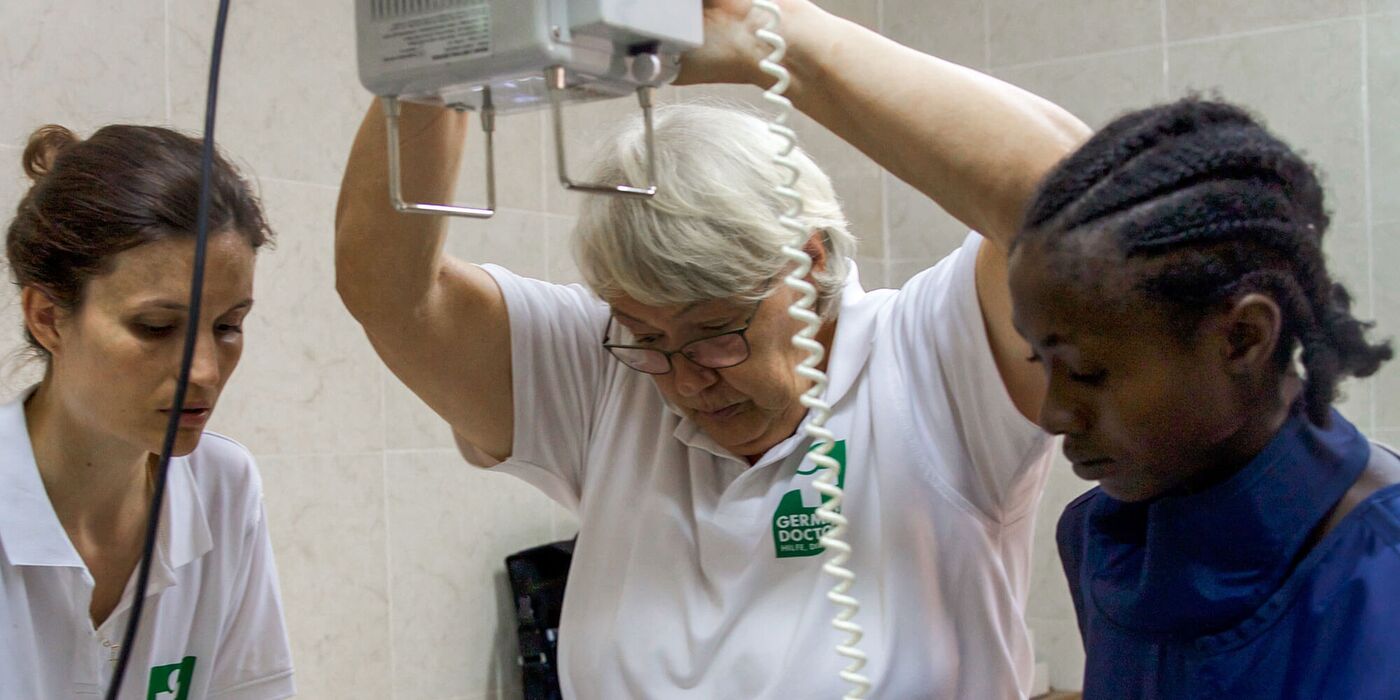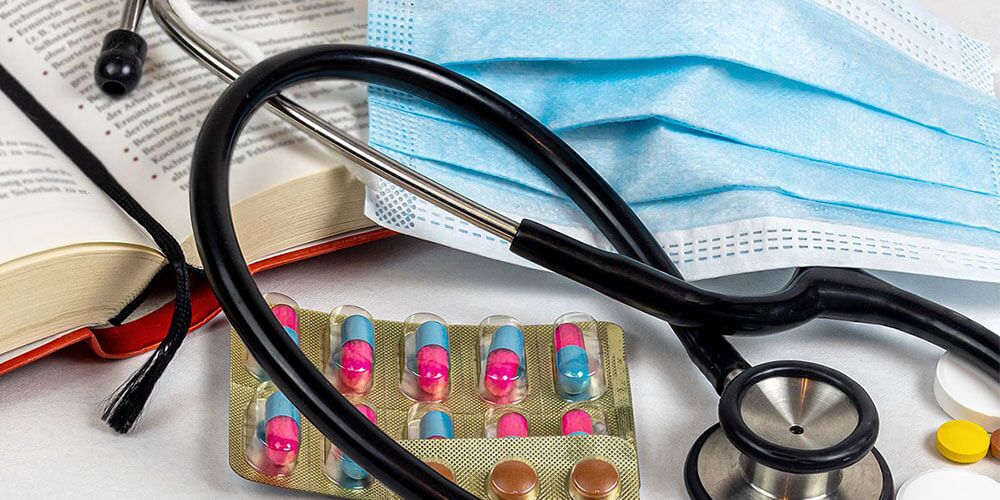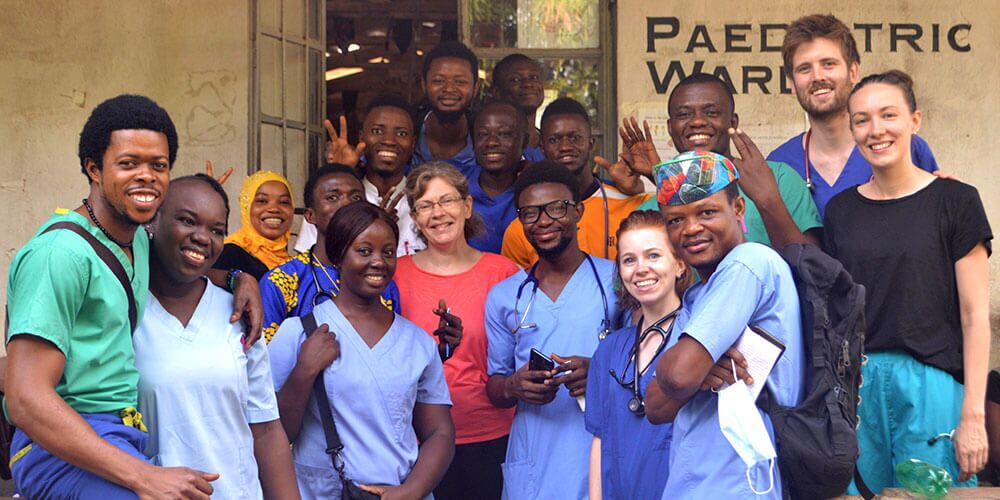
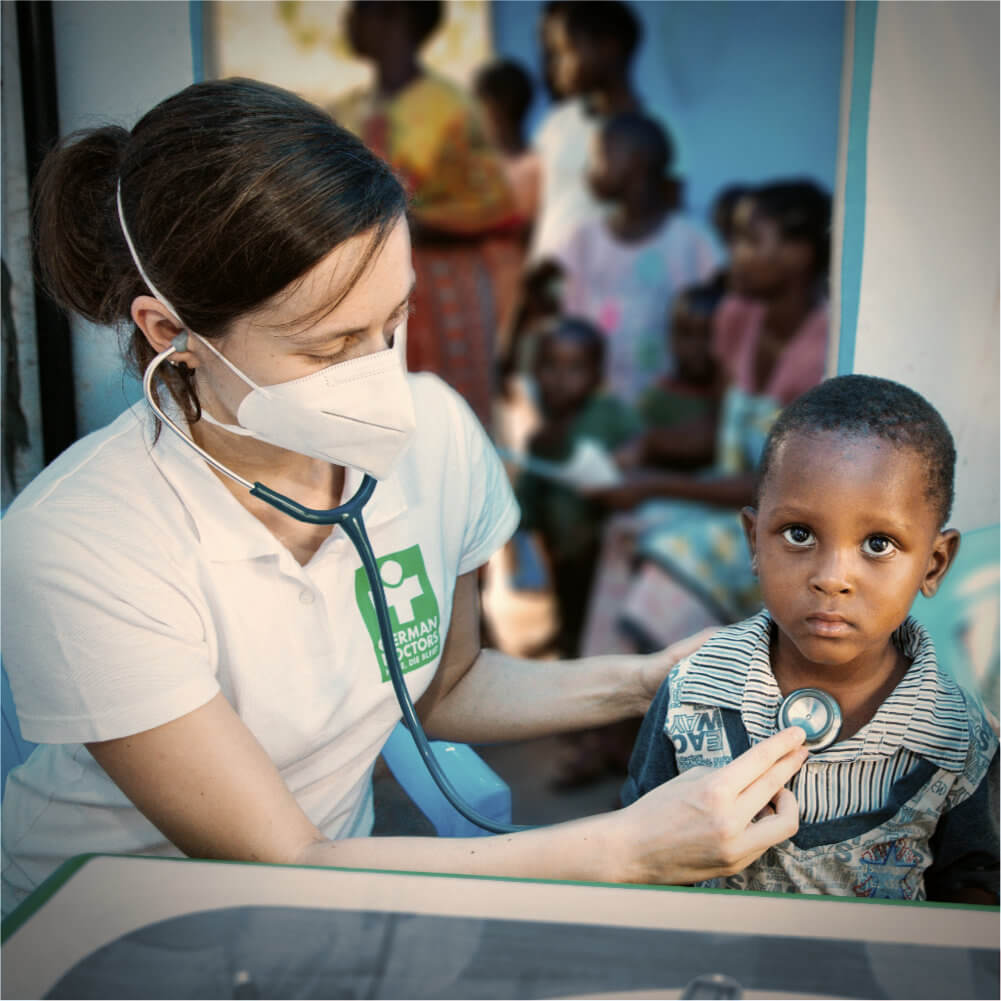
- Doctors for people in need
- |
- Discover projects
- |
- Sierra Leone
- |
- Training Pediatrics in Sierra Leone
- |


- Doctors for people in need
- |
- Discover projects
- |
- Sierra Leone
- |
- Training Pediatrics in Sierra Leone
- |
Training Program Pediatrics
Summary
Battle against child mortality
Every tenth child in Sierra Leone dies before its fifth birthday! This West African country is one of the countries with the highest rate of child mortality in the world. The pronounced lack of specialist medical personnel is one of the main reasons. There are only about 150 physicians, many of whom are not specialized, for the almost eight million inhabitants. Especially tragic is that most of the diseases which kill children, among them malaria, pneumonia, and diarrhoea, could be easily treated or even prevented. The risk of women dying from complications during pregnancy or childbirth is also far greater in Sierra Leone than in almost all other countries in the world.





The training program in pediatrics has begun
Due to the lack of doctors, patient care in Sierra Leone is largely performed by nurses and so-called Community Health Officers (CHOs) who have completed three years of further medical training which enables them to carry out basic medical care in hospitals. However, sound knowledge concerning the treatment of children is lacking in many hospitals, especially in remote rural areas.
Well-trained specialists are urgently needed to sustainably change the situation! We are both proud and happy that, after years of intensive preparations, we could launch a training program in pediatrics in the fall of 2021. The students complete their studies with a Bachelor’s Degree. This entitles them to work on pediatric wards in state hospitals in Sierra Leone and to impart their knowledge to other local health workers. Our voluntary doctors are significantly involved in this training.
Battle against child mortality
Every tenth child in Sierra Leone dies before its fifth birthday! This West African country is one of the countries with the highest rate of child mortality in the world. The pronounced lack of specialist medical personnel is one of the main reasons. There are only about 150 physicians, many of whom are not specialized, for the almost eight million inhabitants. Especially tragic is that most of the diseases which kill children, among them malaria, pneumonia, and diarrhoea, could be easily treated or even prevented. The risk of women dying from complications during pregnancy or childbirth is also far greater in Sierra Leone than in almost all other countries in the world.
The training program in pediatrics has begun
Due to the lack of doctors, patient care in Sierra Leone is largely performed by nurses and so-called Community Health Officers (CHOs) who have completed three years of further medical training which enables them to carry out basic medical care in hospitals. However, sound knowledge concerning the treatment of children is lacking in many hospitals, especially in remote rural areas.
Well-trained specialists are urgently needed to sustainably change the situation! We are both proud and happy that, after years of intensive preparations, we could launch a training program in pediatrics in the fall of 2021. The students complete their studies with a Bachelor’s Degree. This entitles them to work on pediatric wards in state hospitals in Sierra Leone and to impart their knowledge to other local health workers. Our voluntary doctors are significantly involved in this training.
Dates & Facts
Project Inception: September 2021
Number of doctors: We annually dispatch about eight volunteer German doctors on six-week missions to accompany the practical training of the students in hospitals. Approximately 12 annual `theoretical’ missions are accomplished by doctors to impart specialist medical knowledge at the Makeni School of Clinical Science every year. The length of these missions is variable. Merel Boom is the long-term doctor stationed at Masanga Hospital.
Partners: Project partners apart from the Government of Sierra Leone (Ministry of Health and Sanitation) are the Norwegian organization Capa Care, which is responsible for further training in surgery, and the US organization Partners in Health (PiH), which provides further medical training in internal medicine. The German Doctors perform training in pediatrics. Partner hospitals for the first clinical rotation in ongoing pediatric training are currently the Masanga Hospital and the Lion Heart Medical Center.


Structure: The national training program lasts for five years. A two-year basic training program is followed by two years of specialist training in pediatrics, surgery, or internal medicine. Volunteer mission doctors support the students in their daily clinical work and teach at the School of Clinical Sciences Makeni. The students work full time in a hospital during the final year of their medical education. Those who complete this education receive a Bachelor’s Degree. Ten medical students are currently registered in further pediatric training, whereby five students will be able to complete their education and five will be able to begin it twice a year in the future.
Priorities: The main goal of this education is to considerably sink the mortality rate among children under five and neonates in Sierra Leone. The training program conveys current, evidence-based, and comprehensive knowledge in pediatrics. After completing their education, the students with Bachelor’s Degrees can work autonomously on pediatric wards in district hospitals in Sierra Leone.
Project Inception: September 2021
Number of doctors: We annually dispatch about eight volunteer German doctors on six-week missions to accompany the practical training of the students in hospitals. Approximately 12 annual `theoretical’ missions are accomplished by doctors to impart specialist medical knowledge at the Makeni School of Clinical Science every year. The length of these missions is variable. Merel Boom is the long-term doctor stationed at Masanga Hospital.
Partners: Project partners apart from the Government of Sierra Leone (Ministry of Health and Sanitation) are the Norwegian organization Capa Care, which is responsible for further training in surgery, and the US organization Partners in Health (PiH), which provides further medical training in internal medicine. The German Doctors perform training in pediatrics. Partner hospitals for the first clinical rotation in ongoing pediatric training are currently the Masanga Hospital and the Lion Heart Medical Center.
Structure: The national training program lasts for five years. A two-year basic training program is followed by two years of specialist training in pediatrics, surgery, or internal medicine. Volunteer mission doctors support the students in their daily clinical work and teach at the School of Clinical Sciences Makeni. The students work full time in a hospital during the final year of their medical education. Those who complete this education receive a Bachelor’s Degree. Ten medical students are currently registered in further pediatric training, whereby five students will be able to complete their education and five will be able to begin it twice a year in the future.
Priorities: The main goal of this education is to considerably sink the mortality rate among children under five and neonates in Sierra Leone. The training program conveys current, evidence-based, and comprehensive knowledge in pediatrics. After completing their education, the students with Bachelor’s Degrees can work autonomously on pediatric wards in district hospitals in Sierra Leone.
Training Program
Training: secure sustainable help
The project for training specialists in pediatrics in based on the experience we gained in the Sereabu project, which has since been completed. The German Doctors were active in the Serabu Community Hospital in Sierra Leone from 2010 to 2021. More than 270 volunteer mission doctors treated about 17,000 patients there annually. Our priority, aside from treating patients, was teaching and training local colleagues, especially Community Health Officers (CHOs). The participants received practical, hands-on training from the German Doctors, who conveyed their own strengths and specialties in their daily work. Thanks to this training, some of those who received specialist training can independently perform anesthesia or life-saving operations, like cesarean sections.
Practice and theory go hand in hand
We have also established the principle of teaching by mission doctors in the new training program. German Doctors are on duty in hospitals in Sierra Leone for six weeks each to support the students during their medical education. They take on the role of supervisors, i.e., they do not perform medical care themselves, but assist the students in diagnosis, treatment, and prescribing medication, among other duties – so-called bedside teaching.



We also send voluntary doctors to support the theoretical education. The entire medical education ending with a Bachelor’s Degree lasts five years, whereby we, together with our partners, closely supervise the third and fourth years of training. During these two years, two-month theoretical blocks alternate with six-month blocks of practical training. The theoretical module on the School of Clinical Sciences Makeni includes lectures, workshops, case discussions, and practical training. The volunteer German Doctors convey their knowledge gained from many years of professional experience with great engagement!
We strengthen local structures in Sierra Leone
We want to create sustainable structures with the training project to improve the long-term medical care of children. As in most of our projects, it is of decisive importance to integrate the government and local stakeholders into the project. The foundation was laid when the Ministry of Health of Sierra Leone signed their support for the program in September 2021. Our goal is to eventually hand over the program completely to Sierra Leone officials.
Training: secure sustainable help
The project for training specialists in pediatrics in based on the experience we gained in the Sereabu project, which has since been completed. The German Doctors were active in the Serabu Community Hospital in Sierra Leone from 2010 to 2021. More than 270 volunteer mission doctors treated about 17,000 patients there annually. Our priority, aside from treating patients, was teaching and training local colleagues, especially Community Health Officers (CHOs). The participants received practical, hands-on training from the German Doctors, who conveyed their own strengths and specialties in their daily work. Thanks to this training, some of those who received specialist training can independently perform anesthesia or life-saving operations, like cesarean sections.
Practice and theory go hand in hand
We have also established the principle of teaching by mission doctors in the new training program. German Doctors are on duty in hospitals in Sierra Leone for six weeks each to support the students during their medical education. They take on the role of supervisors, i.e., they do not perform medical care themselves, but assist the students in diagnosis, treatment, and prescribing medication, among other duties – so-called bedside teaching.
We also send voluntary doctors to support the theoretical education. The entire medical education ending with a Bachelor’s Degree lasts five years, whereby we, together with our partners, closely supervise the third and fourth years of training. During these two years, two-month theoretical blocks alternate with six-month blocks of practical training. The theoretical module on the School of Clinical Sciences Makeni includes lectures, workshops, case discussions, and practical training. The volunteer German Doctors convey their knowledge gained from many years of professional experience with great engagement!
We strengthen local structures in Sierra Leone
We want to create sustainable structures with the training project to improve the long-term medical care of children. As in most of our projects, it is of decisive importance to integrate the government and local stakeholders into the project. The foundation was laid when the Ministry of Health of Sierra Leone signed their support for the program in September 2021. Our goal is to eventually hand over the program completely to Sierra Leone officials.
Living Conditions
Great poverty and infrastructural deficits
Sierra Leone was about to catch up economically after decades of civil war when the continuous ebola epidemic created a massive setback between 2014 and 2016. This West African country lacked trained medical personnel, enough health centers, and well-equipped hospitals. This facilitated the rapid spread of ebola. About 4,000 died of the disease in Sierra Leone, including more than 200 health workers. Although rich in natural resources, Sierra Leone is one of the poorest countries in the world. The infrastructure is completely insufficient. The lives of many citizens is determined by a lack of perspectives; youth unemployment is 70%. The corona pandemic and now the international effects of the war in the Ukraine further worsen people’s living conditions. For example, the costs of gas and diesel fuel have already risen considerably, which in turn influences the provision of electricity by generators. The prices of foods, which are often imported, have greatly increased.




Health: there remains much to be done
Sierra Leone still has a high mortality rate among children, infants, and neonates. Maternal mortality of about 1,120 per 100,000 live births is also very high. Many mothers give birth alone at home, often without electricity, water, or a trained midwife, and many women are undernourished and bear weakened babies. The health situation among the population is generally desolate. Many people do not have even fundamental knowledge about health, hygiene, and disease prevention.
Great poverty and infrastructural deficits
Sierra Leone was about to catch up economically after decades of civil war when the continuous ebola epidemic created a massive setback between 2014 and 2016. This West African country lacked trained medical personnel, enough health centers, and well-equipped hospitals. This facilitated the rapid spread of ebola. About 4,000 died of the disease in Sierra Leone, including more than 200 health workers. Although rich in natural resources, Sierra Leone is one of the poorest countries in the world. The infrastructure is completely insufficient. The lives of many citizens is determined by a lack of perspectives; youth unemployment is 70%. The corona pandemic and now the international effects of the war in the Ukraine further worsen people’s living conditions. For example, the costs of gas and diesel fuel have already risen considerably, which in turn influences the provision of electricity by generators. The prices of foods, which are often imported, have greatly increased.
Health: there remains much to be done
Sierra Leone still has a high mortality rate among children, infants, and neonates. Maternal mortality of about 1,120 per 100,000 live births is also very high. Many mothers give birth alone at home, often without electricity, water, or a trained midwife, and many women are undernourished and bear weakened babies. The health situation among the population is generally desolate. Many people do not have even fundamental knowledge about health, hygiene, and disease prevention.

